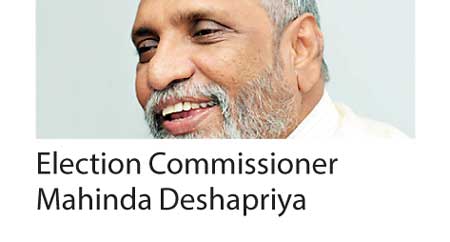Monday Feb 16, 2026
Monday Feb 16, 2026
Friday, 19 January 2018 00:08 - - {{hitsCtrl.values.hits}}
 By Skandha Gunasekara
By Skandha Gunasekara
The Elections Commission yesterday cautioned the public not to attribute state development and infrastructure projects to any politician as they were funded by the public.
Elections Commission (EC) Chairman Mahinda Deshapriya, addressing a press briefing at the Elections Secretariat in Rajagiriya, warned political parties not to politicise state infrastructure projects.
The Chairman said the EC would be carrying out a poster campaign to inform the masses that public-funded development projects belonged to the people and should not be credited to a political party.
“This is not an attack on any party or politician but the people must know that these roads and bridges were built using public funds and were not funded by political parties,” he added.
Public servants should refrain from engaging in political activities as well, Deshapriya said.
“Public servants must not campaign in their employment premises. They cannot use their official position in any way for election activities, whether on duty or not.”
The Chairman announced that postal voting cards had been issued in most districts, with a few more being sent today.
Posting voting for those working in the Police and District Secretariats and election officers would take place on 22 January while postal voting for Government offices, army camps, Sri Lanka Transport Board Depot offices, provincial educational offices, national schools and provincial schools would cast their votes on 25 and 26 January.
“Those who are unable to vote on 22, 25 and 26 January will be allowed to cast their votes on 1 February at the offices of the Elections Commission island-wide. Each party can send one representative not working in any of these Government offices to monitor the polls,” Deshapriya said.
Furthermore, a list of names of candidates contesting for each ward would be sent along with postal ballot papers.
“Although we are not duty bound, we have taken this measure to ensure that Government servants can make a more informed decision when casting their votes,”
Additionally, Deshapriya asserted that the Commission had been able to curb and control the illegal distribution of goods using state resources.
“We were able to take swift action against those who are misusing state resources and are distributing goods. However, we now find that candidates are using their personal finances to distribute goods. In such cases we advise the public to take the goods but not to sell their vote,” he said, remarking that distributing goods to obtain a vote was a form of bribery.
The Chairman said that in an effort to curtail further election law violations, the Elections Commission had deployed teams to each district to record and act on complaints from the public.
“Hambantota and Tissamaharama were two districts that had the highest number of complaints on illegal election posters. We were able to remove all posters in these districts,” he noted.
The Chairman then asserted that the present Local Government elections were significantly more peaceful than in the past but warned that the Election Commission would take legal action against those violating election laws.
“In the past local government elections and the campaign periods were bloodbaths. Now it is far more peaceful. However, be assured that we will take action against those breaking election laws. When it comes to penalties, the Commission works a bit like god but slower. We will come after you either before or after the election. Action will be taken.”
He then pointed out that in addition to the print and electronic media ceasing all propaganda activities 48 hours prior to the election, social media and telecom services too were bound by the same law.
In accordance with the Gazette notification ‘Media guidelines under article 104b (5)(a) of the constitution’ all media including social media and telephone services must stop propaganda activities 48 hours before the vote.”
He also urged the public to report any election law violation to authorities.
“It is the duty of the public to report election laws being violated. We call on the public to inform the Elections Commission or the police.”